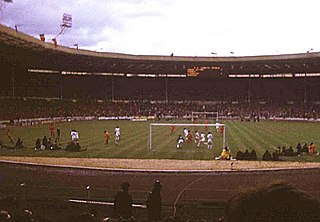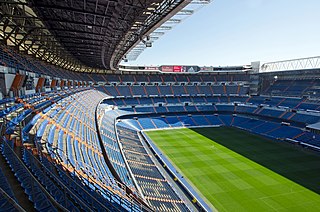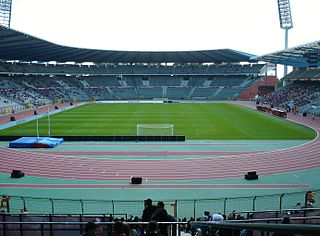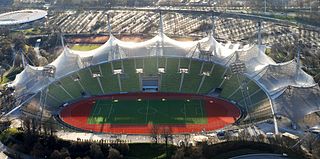
The 1960–61 European Cup was the sixth season of the European Cup, UEFA's premier club football tournament. The competition was won by Benfica, who won 3–2 in the final against Barcelona, who had knocked out Spanish rivals Real Madrid, winners of the first five tournaments, in the first round. Benfica was the first Portuguese team to reach the final and to win the tournament. For the first time a Norwegian club participated.

The 1962–63 European Cup was the eighth season of the European Cup, a football competition for European clubs. The competition was won by Milan, who beat two-time defending champions Benfica in the final at Wembley Stadium in London. Milan's victory was the first by an Italian club.

The 1963–64 season of the European Cup club football tournament saw Internazionale win the title with a 3–1 victory over Real Madrid. It was the second consecutive season that an Italian team had won the competition.

The 1964–65 European Cup, the 10th season of the football club tournament, was won by Internazionale for the second time in row, in a final match against two-time former champions Benfica, making it three consecutive titles for Italy.

The 1967–68 European Cup was the 13th European Cup, UEFA's premier club football tournament. The competition was won by Manchester United, who beat Benfica 4–1 in the final at Wembley Stadium, London. The European Cup title marked the tenth year since the Munich air disaster, in which eight United players were killed and their manager, Matt Busby, was left close to death, the day after earning a place in the semi-finals of the 1957–58 competition. It was also the first time an English side had won the trophy.

The 1968–69 season of the European Cup football club tournament was won by Milan, who beat Ajax 4–1 in the final, giving Milan its first European Cup title since 1963, and its second overall. A number of Eastern Bloc clubs withdrew from the first two rounds when UEFA paired up all of the Eastern Bloc clubs against one another in the aftermath of the Soviet invasion of Czechoslovakia.

The 1969–70 season was the 15th in the history of the European Cup, a club football tournament organised by UEFA for the domestic league champions of its member associations. It was won by Feyenoord of the Netherlands, who beat Scottish club Celtic after extra time in the final at San Siro in Milan on 6 May 1970. It was the first time the title had been won by a club from the Netherlands, and sparked a period of Dutch dominance in the competition, as Ajax won the next three titles. For this season, tiebreaker playoffs were abandoned in favour of the away goals rule; if both teams had scored the same number of away goals, one side was eliminated by the toss of a coin, something that was required in two of the matches.

The 1971–72 season of the European Cup football club tournament was won for the second consecutive time by Ajax, who beat Internazionale in the final. Ajax qualified as the current holders of the European Cup, not as the current national league champion. This was the second year in a row that the European Cup had two Dutch clubs compete.

The 1973–74 season of the European Cup football club tournament was won for the first time by Bayern Munich, beginning their own three-year period of domination, in a replayed final against Atlético Madrid, the only such occasion in the tournament's final. This was the first time the cup went to Germany, and the only European Cup final to require a replay after the first match was drawn 1–1 after extra time.

The 1977–78 season of the European Cup football club tournament was won by defending champions Liverpool in the final against Brugge. The match finished 1–0, starting a run of six consecutive finals that finished 1–0 after 90 minutes, five of them won by English clubs.

The 1978–79 season of the European Cup football club tournament was won by English champions Nottingham Forest in the final against Swedish side Malmö FF. Forest, enjoying a great run of success under Brian Clough, had defeated defending two-time champions Liverpool in the first round.

The 1982–83 season of the European Cup football club tournament was won for the first time by Hamburg, who beat Juventus 1–0 in the final at Athens' Olympic Stadium.

The 1984–85 season of the European Cup club football tournament was overshadowed by the Heysel Stadium disaster that happened prior to the final match. That edition was won for the first time by Juventus in a 1–0 win against defending champions Liverpool. At sporting level, with this result they became the first club to have won all three major European trophies, as well a posteriori as the one that needed the shortest amount of time to complete this.

The 1987–88 European Cup was the 33rd season of the European Cup club football tournament. The competition was won for the first time by PSV Eindhoven, who defeated two-time winners Benfica in the final at Neckarstadion in Stuttgart. PSV became the first Dutch team to win the title in 15 years. They also set a record by winning only three matches on their route to the Cup, including no wins from the quarter-final onwards.
The 1990 FIFA World Cup qualification UEFA Group 7 was a UEFA qualifying group for the 1990 FIFA World Cup. The group consisted of Belgium, Czechoslovakia, Luxembourg, Portugal and Switzerland.
The UEFA Euro 2004 qualifying play-offs were the last round of qualifying competition for UEFA Euro 2004. They were contested by the ten runners-up from the first-round groups of the UEFA Euro 2004 qualifying tournament. The winners of each of the five home and away ties joined the group winners in the European Championship in Portugal. The matches were played on 15 and 19 November 2003.
Group 5 of the UEFA Euro 1972 qualifying tournament was one of the eight groups to decide which teams would qualify for the UEFA Euro 1972 finals tournament. Group 5 consisted of four teams: Belgium, Portugal, Scotland, and Denmark, where they played against each other home-and-away in a round-robin format. The group winners were Belgium, who finished two points above Portugal.
The 2020–21 UEFA Nations League B was the second division of the 2020–21 edition of the UEFA Nations League, the second season of the international football competition involving the men's national teams of the 55 member associations of UEFA.
1982 FIFA World Cup qualification UEFA Group 6 consisted of five of the 34 teams entered into the European zone: Scotland, Sweden, and Portugal, Northern Ireland and Israel. These five teams competed on a home-and-away basis for two of the 14 spots in the final tournament allocated to the European zone, with the group's winner and runner-up claiming that spot.
The 2022–23 UEFA Nations League B was the second division of the 2022–23 edition of the UEFA Nations League, the third season of the international football competition involving the men's national teams of the 55 member associations of UEFA.










